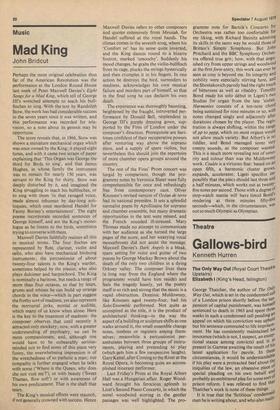Gallows-bird
Kenneth Hurren
The Only Way Out (Royal Court Theatre Upstairs) Elizabeth I (King's Head, Islington)
George Thatcher, the author of The 011J' Way Out, which is set in the condemned cell of a London prison shortly before the sus; pension of capital punishment, was himsell sentenced to death in 1963 and spent three weeks in such a condemned cell pending an, appeal on which his conviction was uPtielu but his sentence commuted to life imprison.ment. He has consistently maintained hi innocence (which is not, I suspect, an e(ec!'" tional stance among convicts) and is a.t present in Gartree awaiting the result of Ills latest application for parole. In these circumstances, it would be understandable if his play were a protracted beef about filet iniquities of the law, an obsessive piece 0: special pleading on his own behalf ana, probably an embittered plea for some sort 0! prison reform. I was relieved to find that Thatcher's work is none of these things. , It is true that the 'fictitious' condeMil.° man he is writing about, and who also MO' tains his innocence, is less than complimentary about the police and about court procedures and takes the view that, while he is Confident of a reprieve on appeal, the legal establishment will not quash his conviction, since that would be an admission of its previous incompetence and of the part played bY the police in the 'frame-up'. The statement of the man's case occupies a relatively stnall part of the proceedings, though, and IS not notably plausible either; nor does it seem to bear the remotest resemblance to Thatcher's own case. As for the portraits he draws of the prison officers, the reasonable cletnands of conflict are enough to excuse tIC presence of one rather tediously vehement disciplinarian, and the two most frequently in attendance are characterised With somewhat more sympathy than he accords theiraggressively impatient prisoner. It is difficult to think that Thatcher was not roved to write the play by a fierce desire to eus attention on his own plight as, he Claims, an innocent man unjustly incarcerated. The fact that he set about the job with careful restraint rather than hysterical !hclignation probably makes it the more IllselY that his purpose will be accomplished ; and it has certainly resulted in an admirable Piece of theatre. There could, I daresay, be some argument about Thatcher's contention, both implicit and explicit, that those most concerned in seeing that justice is done are not necessarily above complicity in subverting it (but he is e,ntitled to his point of view, and there won't be many who could refute it). It might also be said that, insofar as it is concerned with the bizarre ritual of hanging and the attitudes of those involved in it, the play has been deprived of some urgency by the abolition of that gruesome business. None °,..f this, however, is precisely relevant to an "ssessment of what is essentially a study of a Man under stress (the sort of thing, of efourse, that all forms of drama from low aree to high tragedy are about). In this resPect the play is worthily organised, most ef its dialogue has the grip of authenticity, and the characters and their relationships .1-e explored and developed with an experuse that requires none of the fond indulgence astially extended to the first plays of new vvriters in fringe theatres. The fairytale ?Income of the enterprise would be, I PPose, the success of the author's bid for Ireedom and his return to society in time to Oavid Halliwell's taut and tactful pro;41etion of his work, but life is not often as heeemmodating as that, and the chances are "just have to take the word of the rest of elll_Sf that it could hardly have been more o,,ectively done, and that the performances I' tlrian Croucher as the condemned man hl.kl of Steve Halliwell and Oliver Smith as
Warders are probably pretty close to at he had in mind:
I Would not venture to guess what sort of ,.e.r.fbrmance Paul Foster had in mind for ectizabeth I, the sorry burlesque he has boncocted of some of the incidents in the asY reign of that lady as they might have
been portrayed by a troupe of strolling players of the time. The one it gets is terrible, the actors being totally defeated by the feebleness and facetiousness of their script and unfortunately vouchsafing no hint of what might have happened had they won. I shall respect their privacy, and express instead my entrancement with the cheerful way the King's Head continues to ignore such subversions as postal codes, allfigure telephone numbers and decimalisation. It's worth a visit just to see the barroom till ring up I7s.6d. and to get a florin and a sixpenny piece as change.



























 Previous page
Previous page